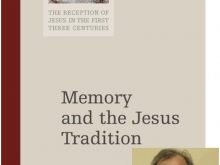
In a recent post, Neil cited a paper by Dr. Alan Kirk called “Memory Theory and Jesus Research.” While Kirk does an adequate job of explaining the current state of play in memory theory, I couldn’t help but notice yet again some misunderstandings in the ways Memory Mavens remember German critical scholarship in general and form criticism in particular. I’ve been putting off this dismally inevitable task, but the time has come to offer some corrections and commentary.
Pale Residues
First, Kirk takes a swipe at William Wrede. He writes:
. . . Wrede’s bifurcation of Markan tradition into surviving elements of empirical history on the one hand and Easter-engendered dogma on the other, with the latter occluding the former, was precursor to the form critics’ model. Of a “historical view of the real life of Jesus,” wrote Wrede, only “pale residues” survive. (Kirk 2011, p. 809-810, emphasis mine)
Kirk argues that the form critics, taking their cue from Wrede, believed memory and personal eye-witness recollections were synonymous and that the Jesus traditions which effectively buried those recollections were something entirely different.
While memory traces of this sort lay at the origins of the tradition, they were a residuum, largely inert with respect to developments in the tradition itself. The salient image was of so-called authentic memories of Jesus coming to be buried under multiple layers of “tradition.” Tradition, in other words, had little to do with memory. (Kirk 2011, p. 809)
How does Kirk’s analysis square with what Wrede actually said? Kirk’s wording may lead the casual reader to infer from the first citation above that Wrede was referring to the general state of Mark’s sources or, to put in another way, the overall character of the various streams of oral and written tradition available to the author of Mark.
But that would be wrong. Continue reading “Alan Kirk: Misremembering Bultmann and Wrede”

